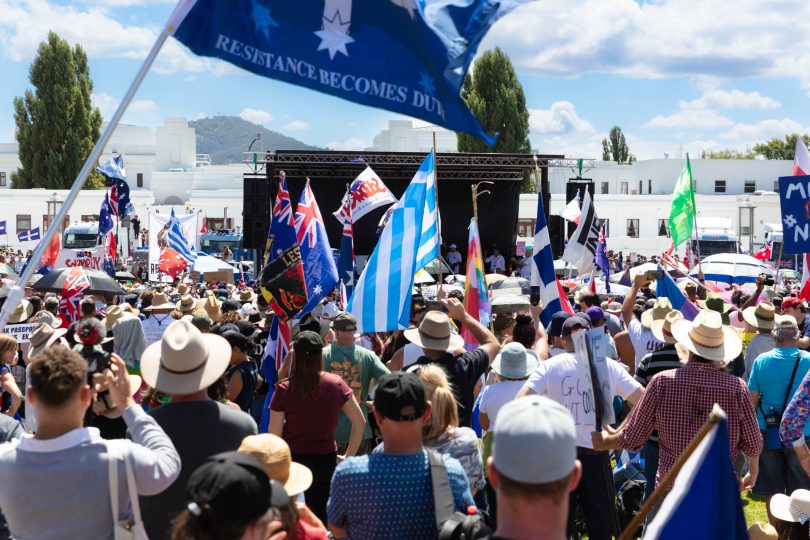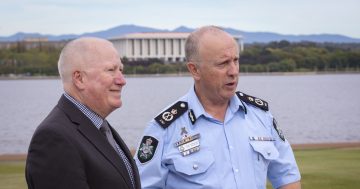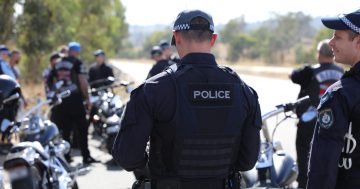
Earlier this year, crowds numbered in the thousands as they descended on Canberra to protest vaccine mandates and lockdowns. Photo: Thomas Lucraft.
The Convoy to Canberra and its mass protest is quickly becoming a distant memory for many Canberrans, but police continue to monitor the remaining stragglers using new surveillance technology and the city’s existing CCTV network.
There are believed to be around 20 protesters who are still in the Territory and camping at different locations.
It’s been almost a year since a massive group of so-called ‘freedom protesters’ descended on the National Capital largely to demonstrate their opposition to vaccine mandates and COVID-19 lockdowns.
Those protesters wreaked havoc on the city’s traffic and roads, camped illegally near the National Library and eventually booked out EPIC before being evicted from those campgrounds in mid-February.
The latter action scuppered the Lifeline bookfair and raised the hackles of many locals.
Managing the mass protest and some of the issues that arose was challenging for police and left an expensive bill for taxpayers.
That bill now tallies upwards of $5 million, and discussions continue regarding who will pay it.

Minister for Police and Emergency Services Mick Gentleman said police had done well to manage large numbers of protesters up until now. Photo: Region.
Police Minister Mick Gentleman revealed in annual reports hearings on Thursday (3 November) that policing the remaining group would be easier if officers knew exactly what they were protesting and why they were here.
“Police are trying to work through their intelligence areas to understand why that is occurring and how we can deal with them,” he said.
“They have done pretty well up until now using interesting resources to identify protesters with new technology … that works with our CCTV cameras to identify people and work out where they are going and where they have been.”
The protesters are also prolific users of social media.
Mr Gentleman said community anger following COVID-19-associated measures had been challenging to manage locally, particularly as it seemed to primarily be coming from people who lived interstate.
He said police had faced some challenges relating to the legislative framework.
Some of the remaining protesters have been camping at locations such as the Cotter and Black Mountain and Region understands police are frustrated by their inability to prosecute these people when they are allegedly illegally camping on public grounds.
Chief Police Officer Neil Gaughan earlier this year told ABC Radio some people were deliberately exploiting loopholes in the law.
“I have instructed my officers to crack down on this behaviour. People who ignore police directions not to camp at locations other than official ACT campgrounds will be charged accordingly and brought before the courts,” CPO Gaughan said.
“While we respect people’s right to protest, what they don’t have a right to do is to turn any piece of vacant land they take a fancy to into a campground.”
In some instances, protesters have been spotted camping overnight in rural, isolated spots of NSW.
It’s been raised with Region the definition of illegal camping held by police, prosecutors and the law have some differing elements.
Police in the Territory are allowed to seize or remove vehicles that are being used to camp on land that is not designated for camping.
The ACT Director of Public Public Prosecutions declined to comment as these matters are before the courts.















